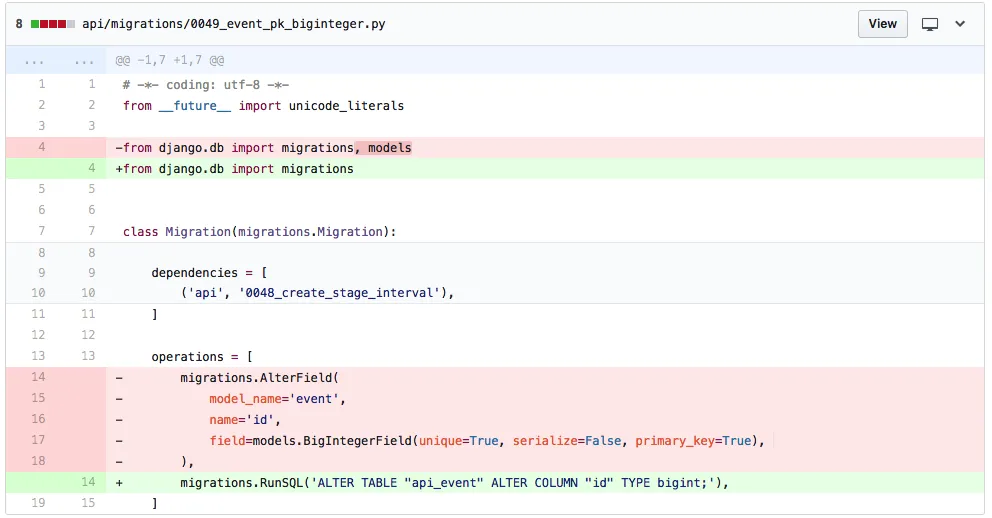We noticed that the id values on one of our high-churn tables were creeping up towards maxint, so we decided to convert the id column to a bigint. It was more difficult than we expected, so I’m documenting it here for future reference.
A major point in our favor was that no other table has a foreign key to api_event. That would probably have made things more complicated.
We started out just adding to the model definition:
id = models.BigIntegerField(unique=True, primary_key=True)
Previously, we had not had a column called ‘id’, but used the one Django made one for us automatically. Unfortunately, adding the column caused Django to prepare INSERT statements differently. With the explicit id = models.BigIntegerField(..), Django will format an insert to say:
INSERT INTO api_event(id, message, ...) VALUES
(null, 'the message', ...),
(null, 'another message', ...);
This is different from omitting the column (as Django did before adding the explicit column) or using the default keyword in place of null. Postgres rejects this insert, because id has a NOT NULL constraint.
So we made a migration without changing the Django model:

This actually was going to work fine. I ran this locally, and started it on the dev server. Problem was: it was going to take about an hour, holding an exclusive lock on the event table the whole time. That wasn’t going to fly.
After some more research, we found a stackoverflow post that looked like exactly our situation (no foreign keys pointing to the id we’re changing): http://stackoverflow.com/a/33509181/1586229 We copied that solution and tried it on the dev server.
At this point, we ran into another hiccup. We were running our migrations via a heroku run -x python manage.py migrate --noinput, and the connection kept timing out before our migration was through. So we made the migration re-entrant safe. Each time we ran migrations, it would do as much work as it could, but always leave the database in a consistent state — with a new_id either null or equal to id. Then, we’d do the final renaming of columns inside a transaction. Here’s what that looked like:
# -*- coding: utf-8 -*-
from __future__ import unicode_literals
from django.db import migrations
# http://stackoverflow.com/a/33509181/1586229
def change_id_col_concurrently(apps, schema_editor):
"""
We see this migration timing out on dev, so we're making it re-entrant safe.
The hope is that we can make progress on each time we run.
(our progress is preserved because we've exited the atomic block).
"""
schema_editor.atomic.__exit__(None, None, None)
with schema_editor.connection.cursor() as c:
c.execute('''
SELECT column_name
FROM information_schema.columns
WHERE table_name='api_event' and column_name='new_id';
''')
column_exists = len(c.fetchall()) > 0
if not column_exists:
schema_editor.execute('ALTER TABLE api_event ADD COLUMN new_id bigint;')
with schema_editor.connection.cursor() as c:
c.execute('SELECT min(id), max(id) FROM api_event WHERE new_id IS NULL')
min_id, max_id = c.fetchall()[0]
if min_id is not None and max_id is not None:
for low in xrange(min_id, min(max_id, 2**31 - 1), 10000):
schema_editor.execute(
'''UPDATE api_event SET new_id = id WHERE id between %(low)s and %(high)s''',
dict(low=low, high=low + 10000))
schema_editor.execute('DROP INDEX IF EXISTS api_event_pk_idx')
schema_editor.execute('CREATE UNIQUE INDEX CONCURRENTLY api_event_pk_idx ON api_event(new_id);')
schema_editor.execute('''
BEGIN;
ALTER TABLE api_event DROP CONSTRAINT api_event_pkey;
CREATE SEQUENCE api_event_new_id_seq;
ALTER TABLE api_event ALTER COLUMN new_id SET DEFAULT nextval('api_event_new_id_seq'::regclass);
UPDATE api_event SET new_id = id WHERE new_id IS NULL;
ALTER TABLE api_event ADD CONSTRAINT api_event_pkey PRIMARY KEY USING INDEX api_event_pk_idx;
ALTER TABLE api_event DROP COLUMN id;
ALTER TABLE api_event RENAME COLUMN new_id to id;
ALTER SEQUENCE api_event_new_id_seq RENAME TO api_event_id_seq;
SELECT setval('api_event_id_seq', (SELECT max(id) FROM api_event));
COMMIT;
''')
class Migration(migrations.Migration):
dependencies = [
('api', '0048_create_stage_interval'),
]
operations = [
migrations.RunPython(change_id_col_concurrently),
]